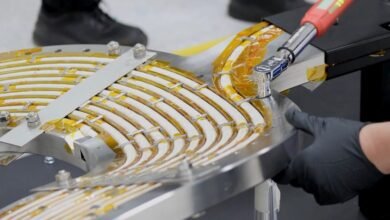Doorstep Secures $8M to Solve Missing Food Deliveries

▼ Summary
– Doorstep was founded by Shashwat Murarka to solve the problem of unreliable food delivery tracking inside buildings where standard GPS fails.
– The company’s technology integrates with existing delivery apps and uses phone sensors to track a driver’s movement through buildings to the doorstep.
– This tracking data is provided to delivery platforms to automate dispute resolution and validate deliveries without collecting driver or user information.
– Doorstep recently raised an $8 million seed round to move its technology from pilot to full production and expand hiring.
– The company aims to rebuild trust in delivery platforms by making drivers’ work easier and eliminating the frustration of missing orders.
For countless people, the experience of ordering a meal only to have it vanish before arrival is a familiar frustration. Doorstep, a startup founded to eliminate this exact problem, has just secured $8 million in seed funding to scale its innovative solution. The company’s technology aims to bring unprecedented clarity to the final, and often most chaotic, stage of a delivery.
The idea was born from the personal annoyances of co-founder Shashwat Murarka. While living in his college apartment, he frequently dealt with orders that never showed up or delivery drivers who were lost and frustrated. That daily irritation sparked a deeper investigation. He began analyzing the delivery supply chain, even working as a driver himself to understand the pain points. He realized that while GPS is excellent for navigating streets, it becomes practically useless the moment a delivery person steps inside a building, creating a significant blind spot. This insight led him to partner with Sheel Patel and launch Doorstep.
Doorstep’s software integrates directly with popular delivery apps such as Uber Eats and DoorDash. Rather than relying on external hardware, it uses the sensors already present in a driver’s smartphone. The technology can detect when a driver enters a building, rides an elevator, and finally arrives at the correct apartment door. This detailed, verifiable data is then shared with the delivery platform.
This information is powerful. It allows platforms to automate dispute resolution for missing orders and validate deliveries with concrete evidence, moving beyond the often unclear photos drivers are required to take. Murarka emphasizes that the system is designed with privacy in mind, adhering to the same security standards the platforms themselves use and not collecting personal data from drivers or users.
The recent $8 million investment round was led by Canaan Partners. Murarka described the fundraising process as intense, recalling that he even slept in the offices of the accelerator Antler when he first arrived in New York. The round was assembled quickly, in about a week, with participation from Antler, Cercano Management, Cassius, and Sean Henry, a scout at Kleiner Perkins. The new capital will be used to transition the technology from pilot programs to full-scale production and to expand the engineering and product teams.
Murarka sees the main competition as hardware-based alternatives, such as building sensors, lockers, and security cameras. He argues that these solutions are costly and difficult to scale widely. Doorstep’s software-based approach, already operational across the United States, offers a more flexible and scalable path forward.
Ultimately, the goal extends beyond simply reducing refunds. Murarka believes Doorstep is about rebuilding trust across the entire delivery ecosystem. He notes that drivers are the backbone of these platforms, and by providing clear data on their work, Doorstep hopes to make their jobs easier and restore customer confidence that their food will actually arrive.
(Source: TechCrunch)




